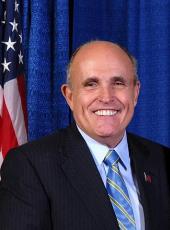
Giuliani Campaign Press Release - Just the Facts #3: Cato Institute Rated Romney "C" In 2006 For His Tax Policy
"As Mitt Romney launches his bid for the Republican presidential nomination, his fiscal record as governor should be scrutinized. Romney likes to advance the image of himself as a governor who has fought a liberal Democratic legislature on various fronts … But Romney will likely also be eager to push the message that he was a governor who stood by a no-new-taxes pledge. That's mostly a myth. His first budget included no general tax increases but did include a $500 million increase in various fees. He later proposed $140 in business tax hikes through the closing of "loopholes" in the tax code. He announced in May 2004 that he wanted to cut the top income tax rate from 5.3 to 5 percent, but that was hardly an audacious stand. Voters had already passed a plan to do just that before Romney even took office. In his budget for 2006, he proposed $170 million more in business tax hikes, almost completely neutralizing the proposed income tax cut. If you consider the massive costs to taxpayers that his universal health care plan will inflict once he's left office, Romney's tenure is clearly not a triumph of small-government activism." (Stephen Slivinski, "Fiscal Policy Report Card On Amercia's Governors: 2006, Cato Institute Policy Analysis, pg. 42, 10/24/06)
Presidential Candidate Romney Says: "It's Absolutely Critical That We Don't Have That Massive Tax Hike And Instead We Make The Bush Tax Cuts Permanent." (Governor Mitt Romney, Remarks At The Detroit Economic Club, Detroit, MI, 2/7/07)
Romney Has Made Extending Bush Tax Cuts A "Central Part" Of Presidential Bid. "After refusing to endorse President Bush's tax cuts when he was governor, Mitt Romney has now made them a central part of his presidential campaign, stirring accusations that he is changing his position to appeal to GOP primary voters." (Casey Ross, "Mitt Changes Tax-Cut Tune," Boston Herald, 2/8/07)
But Romney In 2003 Refused To Publicly Support President Bush's Tax Cuts. "In 2003, Romney stunned a roomful of Bay State congressmen by telling them that he would not publicly support Bush's tax cuts, which at the time formed the centerpiece of the president's domestic agenda." (Casey Ross, "Mitt Changes Tax-Cut Tune," Boston Herald, 2/8/07)
Congressman Barney Frank (D-MA) Was "Very Pleased" That Romney Refused To Support Bush's 2003 Tax Cut. Rep. Barney Frank (D-MA): "I was very pleased … Here you have a freshman governor refusing to endorse a tax cut presented by a Republican president at the height of his wartime popularity." (Wayne Washington and Glen Johnson, "Romney Weighs In – Carefully – On Bush Tax-Cut Plan," The Boston Globe, 4/11/03)
In 2004 Romney Proposed Initiative That Would Undercut President Bush's Tax Incentives For Domestic Businesses. "Romney also, inexplicably, signed on to undercut the American Jobs Creation Act of 2004, signed by President Bush in October, to provide incentives and tax relief to domestic manufacturers. State businesses will forfeit some $30 million under this plan to decouple the state tax code from the federal code." (Editorial, "Closing 'Loopholes' Just A Tax Hike," Boston Herald, 1/10/05)
2004 Romney Initiative Would Decouple Massachusetts And Federal Tax Codes To Allow Massachusetts To Continue Taxing Businesses At Higher Rate. "Gov. Miff [sic] Romney is pushing two initiatives that, combined, could cost Bay State businesses close to $280 million next year and beyond. … A second measure would prevent Massachusetts employers from benefiting fully from the American Jobs Creation Act of 2004, at a cost to companies of $30 million a year. … A second proposed initiative, one that has been filed with the Legislature and is on a fast track to pass before this session ends Jan. 4. It would blunt benefits of the American Jobs Creation Act of 2004 to Bay State employers. The federal law would force Massachusetts which like many states links its tax code to the federal one – to reduce companies' taxable income, costing the state $30 million annually. [State Revenue Commissioner, Alan] LeBovidge said the two tax proposals are about fairness. The administration wants to sever the link for this one tax code change to prevent what it sees as the unintended consequence of lowering the income on which Massachusetts can tax." (Edward Mason, "Romney Targets $280M In 'Loopholes,'" Boston Business Journal, 12/31/04)
Rudy Giuliani, Giuliani Campaign Press Release - Just the Facts #3: Cato Institute Rated Romney "C" In 2006 For His Tax Policy Online by Gerhard Peters and John T. Woolley, The American Presidency Project https://www.presidency.ucsb.edu/node/295450
